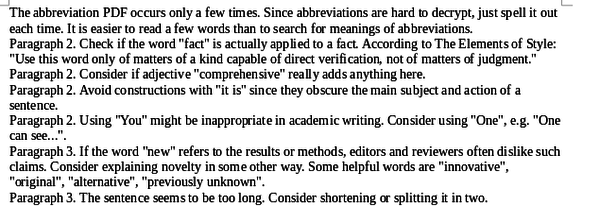Angry Reviewer
A style checker for LibreOffice Writer

© Photo by Andre Hunter on Unsplash
The Angry Reviewer style check can be used to evaluate and improve any type of writing, including academic articles and grant applications.
LibreOffice Writer has hundreds of extensions. Many are cosmetic, trivial, or specialized. However, a handful are major additions to functionality. In the past, some, such as PDF export, have eventually found their way into Writer's default interface. Eventually, the Angry Reviewer style checker may do just that. Although intended to improve academic articles and grant applications, Angry Reviewer is comprehensive and practical enough to be useful for any type of writing. You might call it a Linux version of the much-advertised Grammarly, although its feedback might be presented more usefully.
Angry Reviewer is available on the Angry Reviewer website, but the Writer extension has the advantage of allowing you to work offline and run Angry Reviewer without having to cut and paste. Like all extensions, it can be installed with Tools | Extension Manager. When Writer is restarted, Angry Reviewer is added to the top-level menu. When Check This Text is clicked (Figure 1), a second Writer document is opened with feedback. The two documents can then be placed side by side as you evaluate the feedback and make changes.
Angry Reviewer in Action
When I taught university composition, I told students that if they knew enough about English to effectively use a spell checker or style checker they didn't need one. Too often such tools lead readers astray with their authoritative-sounding feedback – as in the case of one student who began an essay on Gloria Steinem with "For centuries, women have been depressed by men" (which many women insist was not a mistake). The problem is that most of these tools are prescriptive, treat grammar and style as fixed forms, and advocate standards that are several decades behind the times.
By contrast, Angry Reviewer is not only more flexible, but explains enough that writers may actually learn a thing or two while getting a quick fix. Citing sources such as On Writing Well: The Classic Guide to Writing Nonfiction and the all-purpose classic The Elements of Style, the page lists the following rules, followed by examples:
- Don't hype. Avoid words like novel, highly, clearly, greatly. Better still, avoid all adverbs.
- Don't use clichés. In a nutshell, by and large, they are clear as mud.
- Don't use "very" very often. Usually, there is a better word for it.
- Be concise. Avoid phrases like "by means of, despite the fact that, in order to."
- Avoid negatives. For example, use "unable" instead of "not able."
- Avoid redundancy. For example, use "investigate" instead of "conduct an investigation of."
- Use active voice. Although not always possible, most of the text should be in active voice.
- Avoid inappropriate language. Keep words like "really, actually, pretty much" for social networks.
- Avoid rare words and latinisms. Non credo all readers know the meaning.
- Keep abbreviations to minimum. Abbreviations are hard to read, consider just spelling it out.
- Beware of zombie nouns [nominalizations, or nouns made from verbs, adjectives, or other nouns]. Utilization of nominalization is causation of distraction.
Overall, these rules encourage clarity, precision, and conciseness – virtues in any writing. In the feedback to a piece of writing, these rules are offered as suggestions, often with words such as "consider" and "might" that make clear that there is room for differences of opinion. After running this article through Angry Reviewer, one piece of feedback I didn’t apply was to "Avoid constructions with 'it is' since they obscure the main subject and action of a sentence" (though the advice is good in general). All I would add to Angry Reviewer's list of rules is George Orwell's famous ending to his similar list of rules in Politics and the English Language: "Break any of these rules sooner than say anything outright barbarous."
In other words, if you have a solid reason for ignoring Angry Reviewer's feedback, go ahead and do so. For example, if you are writing dialog in fiction, or quoting someone, spoken English is often more ungrammatical than written English, and these rules might not always be appropriate. In another example, when I applied Angry Reviewer to this article (Figure 2), I did not follow the suggestion to spell out "PDF," because my audience can be expected to know the abbreviation. Similarly, I did not change "you" to "one" because that would be too formal (and might be changed by my editor anyway). However, I did divide a sentence flagged as too long. I also considered and sometimes changed several word choices that were questioned. In addition, I observed that I sometimes use unnecessary adverbs and stock phrases such as "By and large" that amount to clichés, and made a mental note to avoid both habits in the future. Overall, I consider Angry Reviewer a useful tool, with even the feedback I rejected forcing me to be more analytical in my editing.
 Figure 2: F2_angry-reviewer-feedback.png: Angry Reviewer's feedback for the first three paragraphs of this article's first draft.
Figure 2: F2_angry-reviewer-feedback.png: Angry Reviewer's feedback for the first three paragraphs of this article's first draft.
I also noticed that Angry Reviewer ignored swear words and slang, and that, unlike Writer's spell check, it did not catch duplicated words or extra spaces. However, the current release is only 1.2, and meanwhile, running spell check and Angry Reviewer one after the other is not much of a burden.
My only criticisms of Angry Reviewer are that it is added to the main menu, when it belongs in the Tools menu (perhaps with an icon on the toolbar), and I would appreciate the option to present each piece of feedback one after the other, with the relevant paragraph displayed. But these come later. Angry Reviewer's feedback is useful no matter how it is presented, and I recommend it for writers of all levels of experience.
Buy Linux Magazine
Subscribe to our Linux Newsletters
Find Linux and Open Source Jobs
Subscribe to our ADMIN Newsletters
Support Our Work
Linux Magazine content is made possible with support from readers like you. Please consider contributing when you’ve found an article to be beneficial.

News
-
AlmaLinux OS Kitten 10 Gives Power Users a Sneak Preview
If you're looking to kick the tires of AlmaLinux's upstream version, the developers have a purrfect solution.
-
Gnome 47.1 Released with a Few Fixes
The latest release of the Gnome desktop is all about fixing a few nagging issues and not about bringing new features into the mix.
-
System76 Unveils an Ampere-Powered Thelio Desktop
If you're looking for a new desktop system for developing autonomous driving and software-defined vehicle solutions. System76 has you covered.
-
VirtualBox 7.1.4 Includes Initial Support for Linux kernel 6.12
The latest version of VirtualBox has arrived and it not only adds initial support for kernel 6.12 but another feature that will make using the virtual machine tool much easier.
-
New Slimbook EVO with Raw AMD Ryzen Power
If you're looking for serious power in a 14" ultrabook that is powered by Linux, Slimbook has just the thing for you.
-
The Gnome Foundation Struggling to Stay Afloat
The foundation behind the Gnome desktop environment is having to go through some serious belt-tightening due to continued financial problems.
-
Thousands of Linux Servers Infected with Stealth Malware Since 2021
Perfctl is capable of remaining undetected, which makes it dangerous and hard to mitigate.
-
Halcyon Creates Anti-Ransomware Protection for Linux
As more Linux systems are targeted by ransomware, Halcyon is stepping up its protection.
-
Valve and Arch Linux Announce Collaboration
Valve and Arch have come together for two projects that will have a serious impact on the Linux distribution.
-
Hacker Successfully Runs Linux on a CPU from the Early ‘70s
From the office of "Look what I can do," Dmitry Grinberg was able to get Linux running on a processor that was created in 1971.


